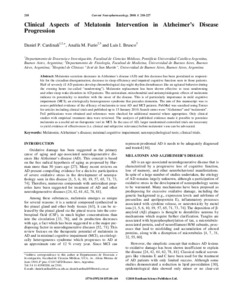Please use this identifier to cite or link to this item:
https://repositorio.uca.edu.ar/handle/123456789/1625| Título: | Clinical aspects of melatonin intervention in Alzheimer's disease progression | Autor: | Cardinali, Daniel Pedro Furio, Analía M. Brusco, Luis I. |
Palabras clave: | MELATONINA; ENFERMEDAD DE ALZHEIMER; ENSAYO CLINICO; RITMO CIRCADIANO; PRUEBAS NEUROPSICOLOGICAS | Fecha de publicación: | 2010 | Editorial: | Bentham Science Publishers | Cita: | Cardinali, D. P., Furio, A. M., Brusco, L. I. Clinical aspects of melatonin intervention in Alzheimer's disease progression [en línea]. Current Neuropharmacology. 2010, 8 (3). doi:10.2174/157015910792246209. Disponible en: https://repositorio.uca.edu.ar/handle/123456789/1625 | Resumen: | Abstract: Melatonin secretion decreases in Alzheimer´s disease (AD) and this decrease has been postulated as responsible for the circadian disorganization, decrease in sleep efficiency and impaired cognitive function seen in those patients. Half of severely ill AD patients develop chronobiological day‐night rhythm disturbances like an agitated behavior during the evening hours (so‐called “sundowning”). Melatonin replacement has been shown effective to treat sundowning and other sleep wake disorders in AD patients. The antioxidant, mitochondrial and antiamyloidogenic effects of melatonin indicate its potentiality to interfere with the onset of the disease. This is of particularly importance in mild cognitive impairment (MCI), an etiologically heterogeneous syndrome that precedes dementia. The aim of this manuscript was to assess published evidence of the efficacy of melatonin to treat AD and MCI patients. PubMed was searched using Entrez for articles including clinical trials and published up to 15 January 2010. Search terms were “Alzheimer” and “melatonin”. Full publications were obtained and references were checked for additional material where appropriate. Only clinical studies with empirical treatment data were reviewed. The analysis of published evidence made it possible to postulate melatonin as a useful ad‐on therapeutic tool in MCI. In the case of AD, larger randomized controlled trials are necessary to yield evidence of effectiveness (i.e. clinical and subjective relevance) before melatonin´s use can be advocated. | URI: | https://repositorio.uca.edu.ar/handle/123456789/1625 | ISSN: | 1570-159X (impreso) 1875-6190 (online) |
Disciplina: | MEDICINA | DOI: | 10.2174/157015910792246209 | Derechos: | Acceso Abierto | Fuente: | Current Neuropharmacology. 2010, 8 (3) |
| Appears in Collections: | Artículos |
Files in This Item:
| File | Description | Size | Format | |
|---|---|---|---|---|
| clinical-aspects-melatonin-intervention-alzheimer.pdf | 279,21 kB | Adobe PDF |  View/Open |
Page view(s)
136
checked on Apr 30, 2024
Download(s)
145
checked on Apr 30, 2024
Google ScholarTM
Check
Altmetric
Altmetric
This item is licensed under a Creative Commons License

